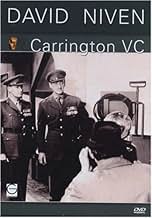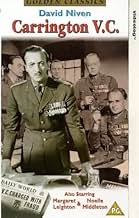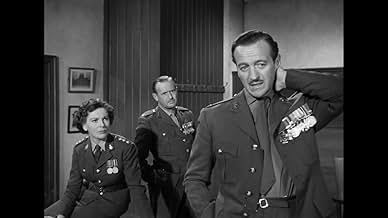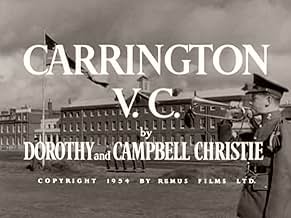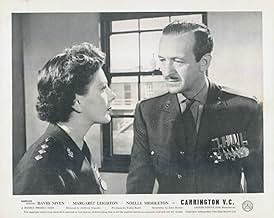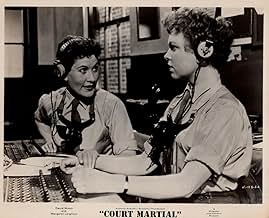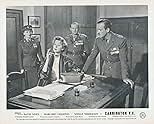Ajouter une intrigue dans votre langueA court-martial attempts to find out why, and if, an officer embezzled his unit's funds.A court-martial attempts to find out why, and if, an officer embezzled his unit's funds.A court-martial attempts to find out why, and if, an officer embezzled his unit's funds.
- Réalisation
- Scénario
- Casting principal
- Nomination aux 5 BAFTA Awards
- 5 nominations au total
Avis à la une
Major David Niven V.C. is up on charges. Two are minor, but the third one can break him, and possibly sent him to prison: that he surreptitiously took 125 pounds from the company safe. His defense is that he was owed the money, which no one denies, and that he told his Commanding Officer that he was going to do it. He told his wife, Margaret Leighton so over the phone; he also told fellow officer Noelle Middleton he had told his C.O. However, the C.O., Allan Cuthbertson, denies it. This being David Niven at the peak of his career, the movie is clearly slanted in Niven's favor, although the evidence presented to the Court is not. That's a necessary part of the dramatic tension.
Anthony Asquith directs this to bring out the ritual nature of Army life. The performances vary between those ritualized interactions, and things said in private in a very engaging fashion.
Asquith had begun his directing career in the silent era with a bang, with two late silent stunners, SHOOTING STARS and UNDERGROUND. Then something happened to his career in the mid-1930s. When he returned to directing in 1938, he specialized in films derived from stage works by Shaw, Rattigan and Oscar Wilde. The performances he got for these first-rate properties were wonderful, but they certainly seemed more staged plays than movies.
Although this movie is an original screenplay, it very much seems an opened-out play. Certainly, it is a a fine adaptation, but it would have taken little work to convert its borders to a proscenium arch. Despite this, it is a fine story with excellent performances all around.
Anthony Asquith directs this to bring out the ritual nature of Army life. The performances vary between those ritualized interactions, and things said in private in a very engaging fashion.
Asquith had begun his directing career in the silent era with a bang, with two late silent stunners, SHOOTING STARS and UNDERGROUND. Then something happened to his career in the mid-1930s. When he returned to directing in 1938, he specialized in films derived from stage works by Shaw, Rattigan and Oscar Wilde. The performances he got for these first-rate properties were wonderful, but they certainly seemed more staged plays than movies.
Although this movie is an original screenplay, it very much seems an opened-out play. Certainly, it is a a fine adaptation, but it would have taken little work to convert its borders to a proscenium arch. Despite this, it is a fine story with excellent performances all around.
Imagine a cross between The Caine Mutiny and 12 Angry Men, and you'll get Court Martial. This military courtroom drama is tense, thrilling, and will keep you at the edge of your seat from beginning to end.
David Niven is a highly respected and decorated major, and he's been court martialed for three offenses: stealing money, entertaining a woman in his quarters, and leaving the base without permission. The entire film takes place in the courthouse, and it is intense! The men on the jury all know David Niven personally, and they try to put their bias aside for the sake of the law. Noelle Middleton, a captain, tries to defend him-but is she also biased, since she was the woman in his quarters? And finally, Niven's wife: Margaret Leighton. Niven insists she's too ill to testify, but when she shows up in court, will she condemn or defend him?
The acting in this film is fantastic, not only by Niven and his two leading ladies, but also by the supporting men on the jury. It's very hard to act in a real-time film, because you constantly have to have an emotional buildup in your character's performance-there's no "three weeks later" downtime in the plot, or a cutaway to another character's side-story. Anthony Asquith must have given his actors great direction, because they were all very convincing. John Hunter's script, based on Campbell and Dorothy Christi's play, is intelligent, thoughtful, and fast-paced; you're going to need to pay close attention on this one, but it's worth it! Unfortunately for this movie, it came out the same year as the more successful The Caine Mutiny, so the Academy forgot about the British drama at the Oscars. Although Humphrey Bogart was very good, David Niven absolutely deserved a nomination for his incredible performance.
David Niven is a highly respected and decorated major, and he's been court martialed for three offenses: stealing money, entertaining a woman in his quarters, and leaving the base without permission. The entire film takes place in the courthouse, and it is intense! The men on the jury all know David Niven personally, and they try to put their bias aside for the sake of the law. Noelle Middleton, a captain, tries to defend him-but is she also biased, since she was the woman in his quarters? And finally, Niven's wife: Margaret Leighton. Niven insists she's too ill to testify, but when she shows up in court, will she condemn or defend him?
The acting in this film is fantastic, not only by Niven and his two leading ladies, but also by the supporting men on the jury. It's very hard to act in a real-time film, because you constantly have to have an emotional buildup in your character's performance-there's no "three weeks later" downtime in the plot, or a cutaway to another character's side-story. Anthony Asquith must have given his actors great direction, because they were all very convincing. John Hunter's script, based on Campbell and Dorothy Christi's play, is intelligent, thoughtful, and fast-paced; you're going to need to pay close attention on this one, but it's worth it! Unfortunately for this movie, it came out the same year as the more successful The Caine Mutiny, so the Academy forgot about the British drama at the Oscars. Although Humphrey Bogart was very good, David Niven absolutely deserved a nomination for his incredible performance.
Major Charles Carrington (David Niven), is arrested for taking £125 from the base safe, he also face two other charges that could finish his distinguished service career. He decides to act on his own defence at his court martial hearing, his argument being that he is owed a lot of money from the army for his various postings that have cost him out of his own pocket. To further complicate the proceedings, Carrington alleges he told his superior, the very disliked Colonel Henniker, that he was taking the money from the safe. A mans career, his marriage, and quite a few reputations, all hang in the balance.
Yes, well it is very British, of that there is no denying, it's very much heel to toe, cup of tea and chin chin chin. So with that in mind {i'm British myself by the way} this may grate on film viewers outside of the British Isles, but it's a really honest and interesting piece that scrutinises the British Court Martial system and rewards the court genre fans royally. Niven is, well Niven, he's always a solid professional who always earned his pay, and good support comes from the ladies of the piece, Margaret Leighton and Noelle Middleton, whilst i must give a mention to the seriously great Victor Maddern, an actor who was far from the A list of British greats but once you put the name to the face, you will see he was always memorable in what films he made.
So as a court room genre fan, and of course a staunch fan of British cinema, i'm going to rate 7/10 with a disclaimer that if those outside of my shores don't get it....well you just don't get it, {nudge nudge wink wink}.
Yes, well it is very British, of that there is no denying, it's very much heel to toe, cup of tea and chin chin chin. So with that in mind {i'm British myself by the way} this may grate on film viewers outside of the British Isles, but it's a really honest and interesting piece that scrutinises the British Court Martial system and rewards the court genre fans royally. Niven is, well Niven, he's always a solid professional who always earned his pay, and good support comes from the ladies of the piece, Margaret Leighton and Noelle Middleton, whilst i must give a mention to the seriously great Victor Maddern, an actor who was far from the A list of British greats but once you put the name to the face, you will see he was always memorable in what films he made.
So as a court room genre fan, and of course a staunch fan of British cinema, i'm going to rate 7/10 with a disclaimer that if those outside of my shores don't get it....well you just don't get it, {nudge nudge wink wink}.
This is quite a decent military court-room drama in which David Niven finds himself accused of pinching a large sum from his battalion funds. At the ensuing court martial, he must answer the charges relying on his honesty and integrity - he has a V. C. after all - and on receiving, somewhat naively, a reciprocal degree of honesty and integrity from others. It's quite a neat little story about revenge and snobbery; tempered with the odd bit of human decency and Niven is ideal for the part. Margaret Leighton is also quite good as his rather aloof wife and Allan Cuthbertson as his supercilious commanding officer "Col. Henniker" who clearly both have axes to grind. The ending isn't great, but otherwise it is a simple story well told.
A brilliant courtroom drama that doesn't rely on flashbacks to present its case but sticks solely to the testimonies of the various parties involved. Carrington is a major being court-martialed for stealing money which he claims was his by right. It's superbly written, (by John Hunter), directed, (by Anthony Asquith) and played, (by a superlative cast of British character actors). David Niven, at his very best, is Carrington and Margaret Leighton is terrific as his highly strung and jealous wife. The Irish actress, Noelle Middleton, is also excellent as the captain with more than a soft spot for Niven. This is a gripping and intelligent film that really deserves to be seen.
Le saviez-vous
- AnecdotesThe VC worn by David Niven was a genuine medal borrowed by the studio. It belonged to Arthur Henry Cross VC, Machine Gun Corps (Camberwell).
- GaffesA British court-martial appeal does not allow new evidence, as it is not a retrial of a case, but a trial of the trial itself, to argue improper procedure or other problems with the trial.
- Citations
Major Broke-Smith: What's he like?
Lt. Col. Reeve: Henniker? Proper bastard if you ask me.
- ConnexionsRemade as ITV Play of the Week: Carrington V.C. (1960)
Meilleurs choix
Connectez-vous pour évaluer et suivre la liste de favoris afin de recevoir des recommandations personnalisées
- How long is Court Martial?Alimenté par Alexa
Détails
- Durée
- 1h 46min(106 min)
- Couleur
- Rapport de forme
- 1.37 : 1
Contribuer à cette page
Suggérer une modification ou ajouter du contenu manquant

